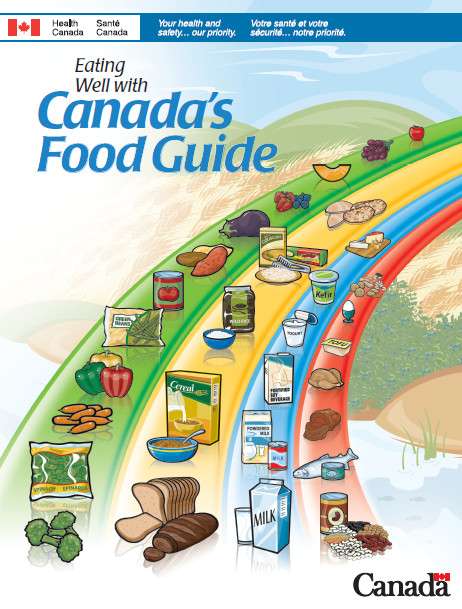At a technical briefing in advance of today’s release of Canada’s updated food guide, Dr. Hasan Hutchinson was asked why anything dairy appeared to be largely absent from the composite plate and snapshots of “healthy eating.”
“Certainly in the picture of the composite plate you’ve got, ah, yogurt — that’s right there in the protein group,” Hutchinson, director general of Health Canada’s office of nutrition policy and promotion, told reporters. And, while it may be hard to see, there is milk in a bowl of porridge and berries.
As expected, “milk and alternatives” — along with “meat and alternatives” — has been scrubbed as a standalone food group in the latest iteration of Canada’s iconic food guide.
The new guide, the first update in more than a decade, recommends vegetables and fruits make up half of any meal and that Canadians choose protein foods that come from plants — not animals — most often.
Hasan said the long-awaited rewrite is based on a rigorous scientific review using the best available evidence, and that industry-commissioned reports were intentionally excluded to reduce any perception of conflict of interest — real or imagined — and to maintain “the confidence of Canadians.”
Gone is the rainbow of the old four food groups: fruit and vegetables; grain products; dairy; and meat. Instead, foods are now grouped into three categories: fruit and vegetables; whole grains (such as whole grain pasta, brown rice and quinoa); and protein foods (lentils, lean red meat, fish, poultry, unsweetened milk and fortified soy beverages, nuts, seeds, tofu, lower fat dairy and cheeses lower in fat and sodium.)
Also gone are recommendations for specific portions or servings of different foods to be eaten daily. Instead, it lists foods Canadians are encouraged to eat on a regular basis, and which ones to limit.

The emphasis is on a high proportion of plant-based foods and replacing foods that contain mostly saturated fat (cream, high fat cheese, butter and the like) with foods that contain mostly unsaturated fats, like nuts, seeds and avocados. A diet higher in vegetables and fruits is linked to a lower risk of cardiovascular disease, eating more nuts or soy protein can help improve blood fat levels and processed meat has been linked to higher risks of colorectal cancer, Health Canada says.
Water should be our “beverage of choice,” the guide says, because it keeps us hydrated without adding calories to the diet. The guide recommends moving away from fruit juices and other sugary drinks (fruit juice has been struck from the “fruits and vegetable” group). And it warns of the health risks of drinking excess amounts of alcohol, including cancer, hypertension and liver disease. Booze can also be a significant source of free sugars and saturated fat when mixed with syrups, sugary drinks or cream-based liquors.
Canadians are also advised to limit their consumption of highly-processed foods and prepare meals and snacks using ingredients that have little to no added sodium, sugar or saturated fats.
The guide will come with a suite of online resources, including videos, recipes and lifestyle advice: Take time to eat. Notice when you are hungry and when you are full. Eat meals with others.
The old food guide recommended two to three servings of meat or alternatives a day, and two to three servings of milk or alternatives daily.
However, according to a recent survey, 6.4 million Canadians have already restricted or eliminated meat from their diets, while a third of the population intends to do so in the coming months.
The Dairy Farmers of Canada have insisted there is “no scientific justification to minimize the role of milk products” in the Canadian diet and that two to four servings of milk products daily can help promote bone and muscle health.
“Lumping milk products together with other protein foods will lead to inadequate intakes of important nutrients,” the Dairy Farmers of Canada’s Isabelle Neiderer, a registered dietitian, said in a recent statement. The organization has warned that any drastic change to the food rules would harm a sector still reeling from concessions granted in recent trade agreements.
However, scientists such as Dr. Walter Willett, a Harvard nutrition expert (who comes from a long line of dairy farmers) has argued humans have no nutritional requirement for animal milk whatsoever. Last week, a team of international scientists said a “planetary diet” — drastically low in red meat and high in legumes (beans and lentils) — could save millions of lives and the planet.
Hutchinson said Health Canada still recommends lower-fat diary as part of a nutritious diet. He said industry had a chance to have their input during two large rounds of public consultations but that Health Canada made a “very strong commitment” not to meet with industry during the revision process.
“We were very clear that when we were looking at the evidence base that we were not going to be using reports that have been funded by industry as well,” said Hutchinson, who acknowledged the “fair amount of criticism” over industry influence in the making of the 2007 guide.
Sylvain Charlebois, a professor in food distribution and policy at Dalhousie University, sees more trouble for the dairy sector ahead, “since you are now seeing a federal agency discouraging consumers from drinking more milk or eating dairy products.”
“We have a very protectionist system in Canada and domestically we have a federal agency that doesn’t necessarily endorse the nutritional role of dairy products as much as they used to,” he said.
He called the revamped guide an “historic” and positive change. “It’s really about nutrition and quality of life, much more so than providing a pamphlet for Canadian agriculture.”
National Post
• Email: skirkey@postmedia.com | Twitter: sharon_kirkey
